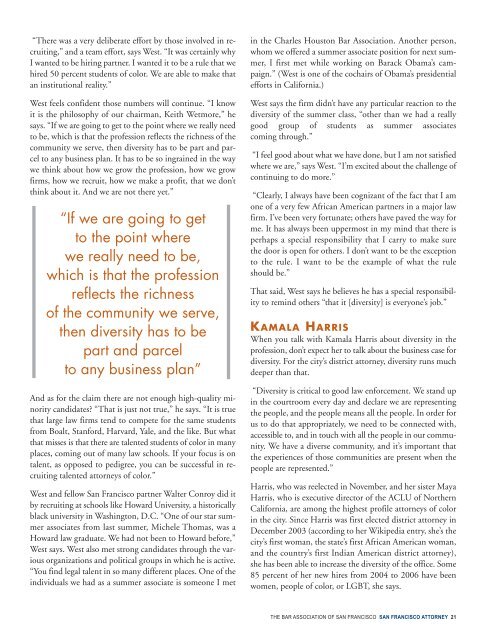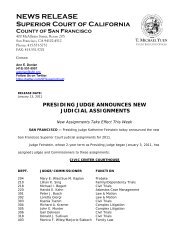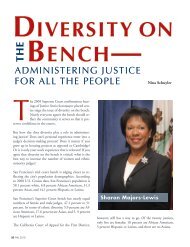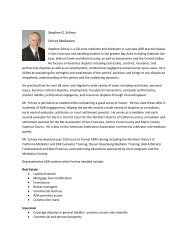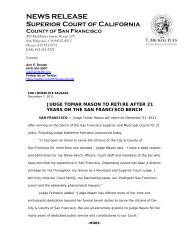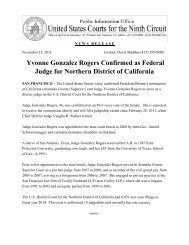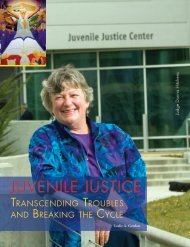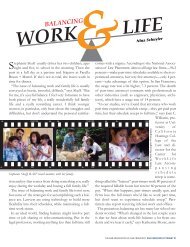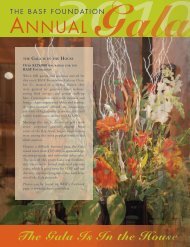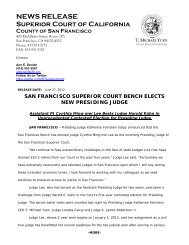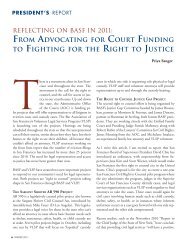Attorneys Working Toward the Tipping Point for Diversity - The Bar ...
Attorneys Working Toward the Tipping Point for Diversity - The Bar ...
Attorneys Working Toward the Tipping Point for Diversity - The Bar ...
You also want an ePaper? Increase the reach of your titles
YUMPU automatically turns print PDFs into web optimized ePapers that Google loves.
“<strong>The</strong>re was a very deliberate ef<strong>for</strong>t by those involved in recruiting,”<br />
and a team ef<strong>for</strong>t, says West. “It was certainly why<br />
I wanted to be hiring partner. I wanted it to be a rule that we<br />
hired 50 percent students of color. We are able to make that<br />
an institutional reality.”<br />
West feels confident those numbers will continue. “I know<br />
it is <strong>the</strong> philosophy of our chairman, Keith Wetmore,” he<br />
says. “If we are going to get to <strong>the</strong> point where we really need<br />
to be, which is that <strong>the</strong> profession reflects <strong>the</strong> richness of <strong>the</strong><br />
community we serve, <strong>the</strong>n diversity has to be part and parcel<br />
to any business plan. It has to be so ingrained in <strong>the</strong> way<br />
we think about how we grow <strong>the</strong> profession, how we grow<br />
firms, how we recruit, how we make a profit, that we don’t<br />
think about it. And we are not <strong>the</strong>re yet.”<br />
“If we are going to get<br />
to <strong>the</strong> point where<br />
we really need to be,<br />
which is that <strong>the</strong> profession<br />
reflects <strong>the</strong> richness<br />
of <strong>the</strong> community we serve,<br />
<strong>the</strong>n diversity has to be<br />
part and parcel<br />
to any business plan”<br />
And as <strong>for</strong> <strong>the</strong> claim <strong>the</strong>re are not enough high-quality minority<br />
candidates “That is just not true,” he says. “It is true<br />
that large law firms tend to compete <strong>for</strong> <strong>the</strong> same students<br />
from Boalt, Stan<strong>for</strong>d, Harvard, Yale, and <strong>the</strong> like. But what<br />
that misses is that <strong>the</strong>re are talented students of color in many<br />
places, coming out of many law schools. If your focus is on<br />
talent, as opposed to pedigree, you can be successful in recruiting<br />
talented attorneys of color.”<br />
West and fellow San Francisco partner Walter Conroy did it<br />
by recruiting at schools like Howard University, a historically<br />
black university in Washington, D.C. “One of our star summer<br />
associates from last summer, Michele Thomas, was a<br />
Howard law graduate. We had not been to Howard be<strong>for</strong>e,”<br />
West says. West also met strong candidates through <strong>the</strong> various<br />
organizations and political groups in which he is active.<br />
“You find legal talent in so many different places. One of <strong>the</strong><br />
individuals we had as a summer associate is someone I met<br />
in <strong>the</strong> Charles Houston <strong>Bar</strong> Association. Ano<strong>the</strong>r person,<br />
whom we offered a summer associate position <strong>for</strong> next summer,<br />
I first met while working on <strong>Bar</strong>ack Obama’s campaign.”<br />
(West is one of <strong>the</strong> cochairs of Obama’s presidential<br />
ef<strong>for</strong>ts in Cali<strong>for</strong>nia.)<br />
West says <strong>the</strong> firm didn’t have any particular reaction to <strong>the</strong><br />
diversity of <strong>the</strong> summer class, “o<strong>the</strong>r than we had a really<br />
good group of students as summer associates<br />
coming through.”<br />
“I feel good about what we have done, but I am not satisfied<br />
where we are,” says West. “I’m excited about <strong>the</strong> challenge of<br />
continuing to do more.”<br />
“Clearly, I always have been cognizant of <strong>the</strong> fact that I am<br />
one of a very few African American partners in a major law<br />
firm. I’ve been very <strong>for</strong>tunate; o<strong>the</strong>rs have paved <strong>the</strong> way <strong>for</strong><br />
me. It has always been uppermost in my mind that <strong>the</strong>re is<br />
perhaps a special responsibility that I carry to make sure<br />
<strong>the</strong> door is open <strong>for</strong> o<strong>the</strong>rs. I don’t want to be <strong>the</strong> exception<br />
to <strong>the</strong> rule. I want to be <strong>the</strong> example of what <strong>the</strong> rule<br />
should be.”<br />
That said, West says he believes he has a special responsibility<br />
to remind o<strong>the</strong>rs “that it [diversity] is everyone’s job.”<br />
KAMALA HARRIS<br />
When you talk with Kamala Harris about diversity in <strong>the</strong><br />
profession, don’t expect her to talk about <strong>the</strong> business case <strong>for</strong><br />
diversity. For <strong>the</strong> city’s district attorney, diversity runs much<br />
deeper than that.<br />
“<strong>Diversity</strong> is critical to good law en<strong>for</strong>cement. We stand up<br />
in <strong>the</strong> courtroom every day and declare we are representing<br />
<strong>the</strong> people, and <strong>the</strong> people means all <strong>the</strong> people. In order <strong>for</strong><br />
us to do that appropriately, we need to be connected with,<br />
accessible to, and in touch with all <strong>the</strong> people in our community.<br />
We have a diverse community, and it’s important that<br />
<strong>the</strong> experiences of those communities are present when <strong>the</strong><br />
people are represented.”<br />
Harris, who was reelected in November, and her sister Maya<br />
Harris, who is executive director of <strong>the</strong> ACLU of Nor<strong>the</strong>rn<br />
Cali<strong>for</strong>nia, are among <strong>the</strong> highest profile attorneys of color<br />
in <strong>the</strong> city. Since Harris was first elected district attorney in<br />
December 2003 (according to her Wikipedia entry, she’s <strong>the</strong><br />
city’s first woman, <strong>the</strong> state’s first African American woman,<br />
and <strong>the</strong> country’s first Indian American district attorney),<br />
she has been able to increase <strong>the</strong> diversity of <strong>the</strong> office. Some<br />
85 percent of her new hires from 2004 to 2006 have been<br />
women, people of color, or LGBT, she says.<br />
THE BAR ASSOCIATION OF SAN FRANCISCO SAN FRANCISCO ATTORNEY 21


